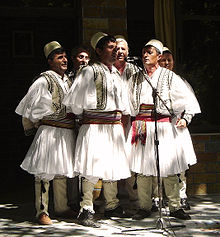| This article is part of a series in |
| Culture of Albania |
|---|
 |
|
|
 | ||||
| Music of Albania | ||||
| General topics | ||||
|---|---|---|---|---|
| Genres | ||||
| Media and performance | ||||
|
||||
| Nationalistic and patriotic songs | ||||
|
||||
The music of Albania (Albanian: Muzika Shqiptare) is associated with the country of Albania and Albanian communities. Music has a long tradition in the country and is known for its regional diversity, from the Ghegs in the North to the Tosks in the South. It is an integral part of the national identity, strongly influenced by the country's long and turbulent history,[1] which forced Albanians to protect their culture from their overlords by living in rural and remote mountains.
Albanian popular music often incorporates the country's folk music. Albanian folk music includes monophonic and polyphonic styles, responses, choral, instrumental and vocal music. Each region has a unique musical tradition that reflects its history, language and culture.[1] Polyphonic singing and song forms are primarily found in South Albania, while in the North they are predominantly monophonic. Albanian iso-polyphony has been declared an UNESCO Intangible Cultural Heritage of Humanity.[2] The Gjirokastër National Folklore Festival, held every five years in Gjirokastër, is an important venue exhibiting traditional Albanian music.
Albanian music extends to ancient Illyria and Ancient Greece, with influences from the Byzantine and Ottoman Empire.[3] It is evident in archeological findings such as arenas, odeons, theatre buildings and amphitheatres, all over Albania. The remains of temples, libraries, sculptures and paintings of ancient dancers, singers and musical instruments, have been found in territories inhabited by the ancient Illyrians and ancient Greeks.[3]
Church singing was performed throughout the early Middle Ages in Albania by choirs or soloists in ecclesiastical centers such as Berat, Durrës and Shkodër.[4] The Middle Ages in Albania included choral music and traditional music.[4] Shën Jan Kukuzeli, a singer, composer and musical innovator of Albanian origin, is one of the earliest known musicians.[5]
Internationally renowned contemporary musicians of Albanian origin from Albania and Albanian diaspora include Action Bronson, Elvana Gjata, Ava Max, Bebe Rexha, Dua Lipa, Era Istrefi, Albert Stanaj, Dafina Zeqiri, Gashi, Ermal Meta, Enca, Elhaida Dani, Noizy, Unikkatil, and Rita Ora. In the field of classical music, several Albanian sopranos and tenors have gained international recognition including Rame Lahaj, Inva Mula, Marie Kraja, Saimir Pirgu and Ermonela Jaho, and the composer Vasil Tole, a member of the Academy of Sciences of Albania. Best voices of Albanian folk music include Vaçe Zela and Nexhmije Pagarusha. Among the most influential and best performers of the Albanian kaba – a folk instrumental expression of the Albanian Iso-Polyphony – are clarinetists Laver Bariu and Remzi Lela, and violinist Ethem Qerimaj.
- ^ a b SPIRO J. SHETUNI. "Albanian Traditional Music - An Introduction, with Sheet Music and Lyrics for 48 Songs" (PDF). galabri.com. Archived from the original (PDF) on 2017-12-26. Retrieved 2017-12-25.
- ^ UNESCO. "Albanian folk iso-polyphony". ich.unesco.org.
- ^ a b Cite error: The named reference
hisalbmcwas invoked but never defined (see the help page). - ^ a b Charles University. "Choral Music in Albania" (PDF). is.cuni.cz. Archived from the original on 2017-12-26.
- ^ Robert Elsie (19 March 2010). Meine Bücher Mein Verlauf Bücher bei Google Play Historical Dictionary of Albania. Scarecrow Press, 2010. p. 252. ISBN 9780810873803.